

 Chapter Seven
The Great War
Chapter Seven
The Great War

Chapter Seven The Great War

To the detriment of the Fatherland, the most extreme political conclusion—the need to conscript of the last man able to bear arms—was not drawn. While, shortly before the war in France, 80% of all able-bodied eligible men were enlisted, only 54% were taken in Germany; in 1913, for example, in Bavaria alone, 20,000 able-bodied and eligible young men remained surplus to requirements, and were required to refer themselves to the Landsturm [territorial reserves] or Ersatzreserve [substitute reserves], where they remained without instruction. 1
While accounts at the time claimed that the "flood" of volunteers was equal to around two million men, this, in reality, is a myth. Hitler was one of only approximately 185,000 volunteers, or less than one-third of one percent of the German population. In fact, owing to inefficient pre-war conscription policies—aggravated by the attrition rates attributable to the initial high-risk strategy of quickly mobilizing reserve units and throwing them into battle—German forces would begin to experience shortages of manpower by September.
The 16th Bavarian Reserve Infantry, known as the List Regiment (16th RIR), is named after its first commander—Colonel Julius von List—and its new recruits are initially billeted in the Oberwiesenfeld Barracks, though much of their training will take place on the Exerzierplatz in Munich.
The regimental clerk is a Sergeant-major named Max Amann, who will later become business manager of the Nazi Party publishing house.
The regimental adjutant, Captain Frederick (Fritz) Wiedemann, will later be Hitler's personal adjutant. Rudolf Hess, later to be Deputy Fuehrer, is also a member of the List Regiment, though he and Hitler will not meet until after the war. 2
Throughout the length of the war, fifty-nine Jews will serve in the List Regiment, sixteen of these as officers. Thirty percent of the Jews in the List Regiment will be honored for bravery, and seventeen percent will be killed in action. 3

The word, on every street corner and in every Englishman's mouth was . . . . Mad dog! Der tolle Hund--that was Germany! . . . . On the street corner reigns the Terror of the Yellow Press. The serious newspapers "Telegraph", "News" continue to exhort calm at first, the one in the morning, the other in the evening. Between morning and evening however, every five minutes, the newspaper boys announce new and newer editions of the two, three most popular halfpenny papers, which even in times of peace had been making business exclusively out of scandal. 4


Comrades! I welcome with all my heart and full confidence all officers, doctors, and officials, all Offiziersstellvertreter, NCOs, and troops. The Regiment, whose men for the most part are untrained, is expected to be ready for mobile deployment within a few weeks. This is a difficult task, but with the admirable spirit which animates all members of this regiment, not an impossible one . . . . With God's blessing, let's begin our work for Kaiser, King, and Fatherland! 8
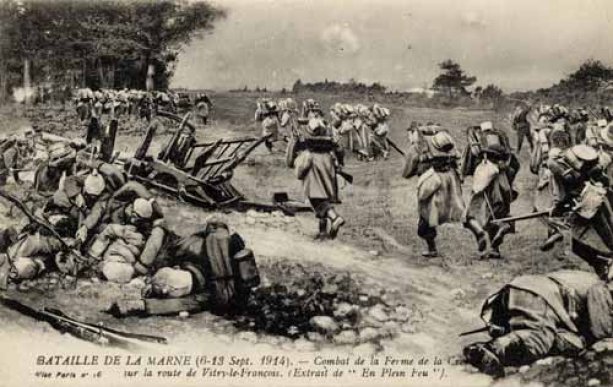

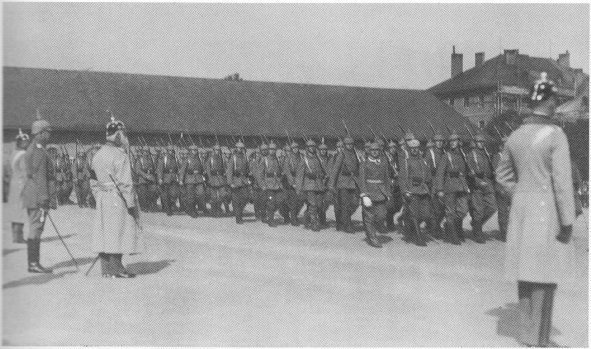
On the day of the swearing-in, there was a double-ration of roast pork and potato salad. Hitler told me several times that the festive day remained particularly pleasant in his memory, as he was always hungry. During the war he was known for being always hungry, and could become ill when the food supply was delayed. 12
From Adolf Hitler's Mein Kampf:As the scene unfolds itself before my mind, it seems only like yesterday. I see myself among my young comrades on our first parade drill, and so on until at last the day came on which we were to leave for the front.
In common with the others, I had one worry during those days. This was a fear that we might arrive too late for the fighting at the front. Time and again that thought disturbed me; and every announcement of a victorious engagement left a bitter taste, which increased as the news of further victories arrived. 13
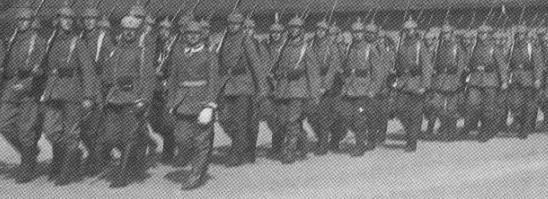
We still gratefully remember the warm welcome we received from the local population—in the places where we had our living quarters—after the exhausting daily exercises on the vast Lechfeld, or from the practice firing range in the meadows of the Lech, singing marching songs with high and clear voices; old and young were out and about and marched with us. After we were dismissed for the day, they took us back into their homes, where the food waited ready for us on their stoves. 16

Lille, and in particular the central station, was a terrible sight. The entire train station was a shambles. The wounded lay everywhere. 1,200 houses were said to have been destroyed in the bombardment, most of them grandiose buildings. There were burnt-out gables and smoking piles of rubble everywhere, along with crying and begging women and children, and withdrawn, sullen men . . . .
In the military hospitals—of which there are fifteen in the city—lie about 4,000 soldiers, most of them seriously wounded, but no clergymen; the French priests are not allowed to visit the injured due to fear of espionage. 17
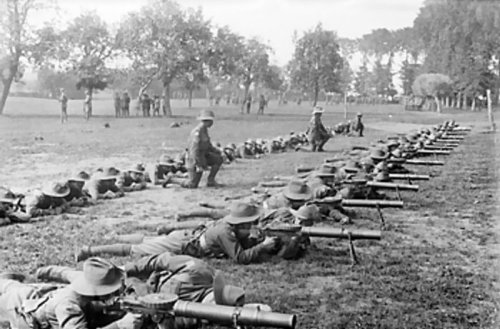

At long last, the day came when we left Munich on war service. For the first time in my life, I saw the Rhine, as we journeyed westwards to stand guard before that historic German river against its traditional and grasping enemy. As the first soft rays of the morning sun broke through the light mist and disclosed to us the Niederwald Statue, with one accord the whole troop train broke into the strains of Die Wacht am Rhein. I then felt as if my heart could not contain its spirit.
1914 October 21 Very early in the morning, Hitler and his regiment are sent by train to the Western Front. The company is in high spirits, singing songs and carrying on as if it were all a grand party. By dawn they are traveling alongside the Rhine and soon catch sight of the giant statue of Germania at Niederwald. The recruits again burst into song, Die Wacht am Rhein. 20
I saw the Rhine for the first time in 1914, when I was on my way to the Western Front. The feelings which the sight of this historic stream inspired in me remain forever graven on my heart. The kindness and spontaneity of the Rhinelanders also made a profound impression on me; everywhere they received us and fêted us in a most touching manner. 21
The reality of the situation for these young recruits is, however, no cause for celebration. The hastily-trained company is led by reserve officers, as the regimental commander has been inactive for many years. They have only a few machine guns, and their telephone equipment is obsolete, having originally been produced—some years previous—for the British army by a firm in Nuremberg.
Even worse, they have no proper iron helmets, but only oilcloth caps (Landsturmmuetzen) of the very same design as those worn during the 1812 wars of liberation. The enthusiastic recruits take none of this into account, however, as they all expect that the war will be over in a few weeks, and that they will all be home by New Years. 22
Eager for the fight and certain of easy victory, the young men of the regiment marched off "to catch the English", as our soldiers said. Everybody was firmly convinced that God had given the English long legs so that they could run all the faster . . . . We thought of portrayals in our newspapers and humorous magazines of [Sic] . . . . [All] we faced was an army of mercenaries [fighting not] for love of Fatherland or sacrificial courage, but for a few pence a day. 23

On the morning of 23 October between 7 and 9 o'clock, our troops arrived in Lille . . . . There had been lengthy delays. For long hours the trains stood immobile at open stretches, then crawled forward from station to station at a snail's pace of 8 kilometers per hour. After a few hours, as Lille approached, unbroken cannon fire was heard, in the Westerly direction of Armentièeres, fliers were seen circling in the brightly illuminated sky—one already felt the vicinity of the Front. 25
From Adolf Hitler's Hepp Letter:After a really lovely journey down the Rhine, we reached Lille on October 23. We could already see the effects of the war as we traveled through Belgium. We saw the conflagrations of war and heard its ferocious winds. As far as Douai, our journey was reasonably safe and quiet. Then came shock after shock. In some places, the base artillery had been destroyed in spite of the strongest defense. We were now frequently coming upon blown up bridges and wrecked locomotives. Although the train kept going at a snail's pace, we encountered more and more horrors: graves. Then in the distance we heard our heavy guns.

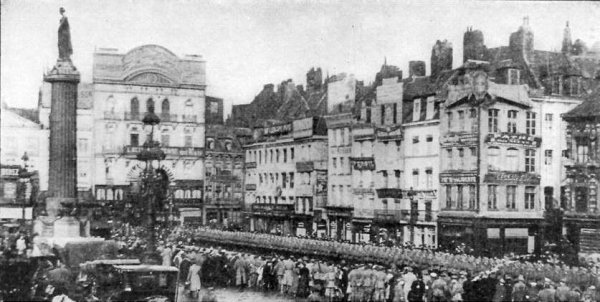
We spent the night in the courtyard of the stock exchange building. This pretentious building was not yet completed. We had to lie down with full packs, and were kept at the ready. It was very cold on the stone pavement and we could not sleep. The next day we changed our quarters, and this time we were in a very large glass building. There was no lack of fresh air, the iron framework was still standing, and the panes of glass had been smashed into millions of fragments in the German bombardment.
During the day, something more was attempted. We inspected the town and, most of all, we admired the tremendous military equipment; and all of Lille lay open, the gigantic shapes of the town rolling before our astonished eyes. At night there was singing, and for me it was the last time. On the third night, about 2 am, there was a sudden alarm and, about 3 am, we marched away in full marching order from the assembly point.
No one knew for certain why we were marching, but in any case we regarded it as an exercise. It was rather a dark night, and we had hardly been marching for twenty minutes when we turned left and met two columns of cavalry and other troops, and the road was so blocked there was no room for us. 26
We have now the fortune to have the Englishmen on our front, the troops of that people whose antagonism has been at work for so many years in order to surround us with a ring of enemies and strangle us. We have to thank them above all for this bloody, terrible war . . . . [When] you meet up with this enemy, [show] them that the German cannot be swept so lightly from world history, show them through German blows of a quite special kind. Here is the enemy who stands most in the way of the restoration of peace. Onwards!

Then morning came. We were now a long way from Lille. The thunder of gunfire had grown somewhat stronger. Our column moved forward like a giant snake. At 9 am, we halted in the park of a country house. We had two hours' rest and then moved on again, marching until 8 pm. We no longer moved as a regiment, but split up into companies, each man taking cover against enemy airplanes. At 9 pm, we pitched camp. I couldn't sleep. Four paces from my bundle of straw lay a dead horse. The animal was already half decayed. Finally, a German howitzer battery immediately behind us kept sending two shells flying over our heads into the darkness of the night every quarter of an hour. They came whistling and hissing through the air, and then, far in the distance, there came two dull thuds. We all listened. None of us had ever heard that sound before.
While we were huddled close together, whispering softly and looking up at the stars in the heavens, a terrible racket broke out in the distance. At first it was a long way off, and then the crackling came closer and closer, and the sound of single shells grew to a multitude, finally becoming a continuous roar. All of us felt the blood quickening in our veins. The English were making one of their night attacks. We waited a long time, uncertain what was happening. Then it grew quieter and at last the sound ceased altogether—except for our own batteries—which sent out their iron greetings to the night every quarter of an hour. In the morning we found a big shell hole. We had to brush ourselves up a bit, and about 10 am there was another alarm and, a quarter of an hour later, we were on the march. After a long period of wandering about we reached a farm that had been shot to pieces and we camped here. I was on watch duty that night and, about one o'clock, we suddenly had another alarm; and we marched off at three o'clock in the morning.
We had just taken a bit of food, and we were waiting for our marching orders, when Major Count Zech rode up: "Tomorrow we are attacking the English!" he said. So it had come at last! We were all overjoyed; and after making this announcement, the Major went on foot to the head of the column. 28
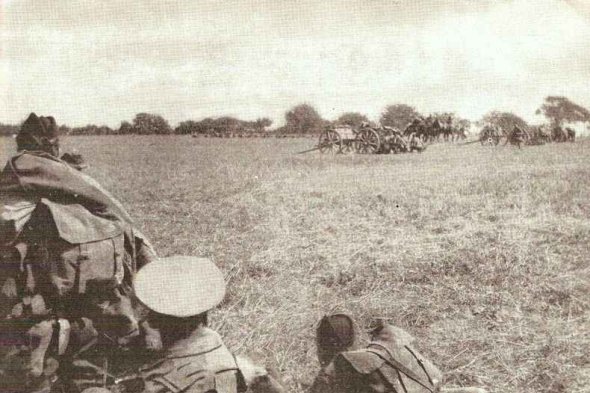
Because the enemy received intelligence from the church tower, through signs and the chiming of the hour and the direction of the hand, the clergymen were arrested and were not allowed to enter the rectory again . . . . My accoutrements—or monk's habit—excited everywhere a great commotion amongst friends and foe alike. I was even to be arrested as a spy, as a result of my dress. For five hours I was closely watched by a constable and 15 men, until the mistake was cleared up. 29
From Adolf Hitler's Hepp Letter:Early, around 6 am, we came to an inn. We were with another company and it was not till 7 am that we went out to join the dance. We followed the road into a wood, and then we came out in correct marching order on a large meadow. In front of us were guns in partially dug trenches and, behind these, we took up our positions in big hollows scooped out of the earth; and waited. Soon, the first lots of shrapnel came over, bursting in the woods, and smashing up the trees as though they were brushwood. We looked on interestedly, without any real idea of danger. No one was afraid. Every man waited impatiently for the command: "Forward!" The whole thing was getting hotter and hotter. We heard that some of us had been wounded. Five or six men brown as clay were being led along from the left, and we all broke into a cheer: six Englishmen with a machine gun! We shouted to our men marching proudly behind their prisoners. The rest of us just waited. We could scarcely see into the steaming, seething witches' caldron, [that] lay in front of us. At last there came the ringing command: "Forward!"


There were few in the regiment as healthy or as full of stamina as Hitler. With unbelievable toughness he endured the greatest strains and never showed any weakness . . . . [The] battle-ordinance, to which Hitler also belonged, was far more exposed to enemy fire than the companies themselves, for while the latter could always find cover in the terrain, the ordinance staff were constantly on the move with messages; and I am amazed even today, how Adolf Hitler came through [the war] so fortunately." 32
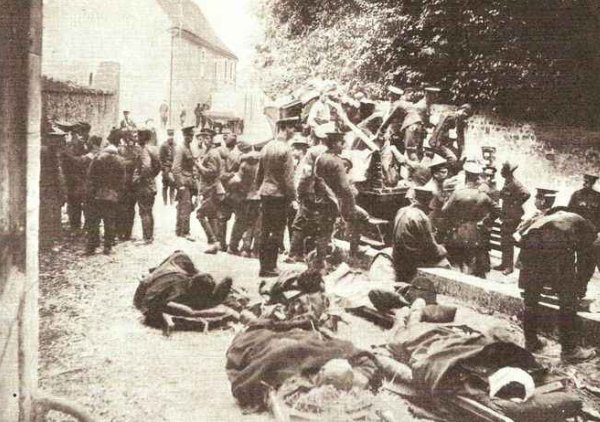
The losses grow under the violent fire that the enemy hurls toward the attackers from cannons and machine-guns. They lean, and fall down on their knees among the hedges, mown down by a burst of fire; but the yawning gaps are always filled again by fresh fighters. Our artillery's lack of ammunition is clearly noticeable; it can offer the attack no effective support.
Morning passes in tough, bloody stand-up fights. A horrifying battle-music&mdasha true concert from Hell&mdashfills the battlefield. The howls, hisses, crashes of the heavy shells of English naval cannons constantly bursting between the lines; the rolls of machine-gun salvos, and the clatter of infantry weapons; the fire rises from violent storms to raging assault, to eerie hurricane. Whole rows [of men] drop while pushing forward, crash back again, break in on themselves. Is it not mad to advance in this fire? And new waves push in, repeated hour after hour. The excitement is unproductive; all reserves are already used up. At last at 3 0'clock in the afternoon the enemy's key-point, the windmill—on the south-slope of the area from where so much [havoc] has been created—is brought under heavy fire by our artillery, is caught cleanly, and is shattered with a few direct hits.
For a moment, enemy fire falls silent. It is like a deep, eerie breathing-space. Then it breaks out with strengthening force: a single fire-spitting maw[Sic]: but on—must go on—forwards! Then, at the critical moment, the assault signal of the buglers is heard over the whole fighting front! Knapsacks are discarded; everyone pulls himself up: Bavarians, Saxons, Swabians, all closed together; there are no more stops; only forwards! A thousand-voiced "Hurrah" roars across the battlefield—a single violent victory cry—and, like a wild surf, the storm waves throw themselves at the village!--Gheluvelt is ours! 33
I could see nothing any more, and could no longer breathe for dust." Hearing cries of help coming from the chÂteau, Mend rushes forward, as a group of Saxons and "a few telegraph operators sprang immediately to the aid of the wounded. At once, one cried out: "The Bavarian colonel [List] is also dead!" In my horror, I left my horse unattended, and sprang to the side of Colonel List, now covered by a tent flap. I lifted this away and saw that blood welled from his mouth. [Our] brave commander, who was a true leader of his troops, was no more. 34
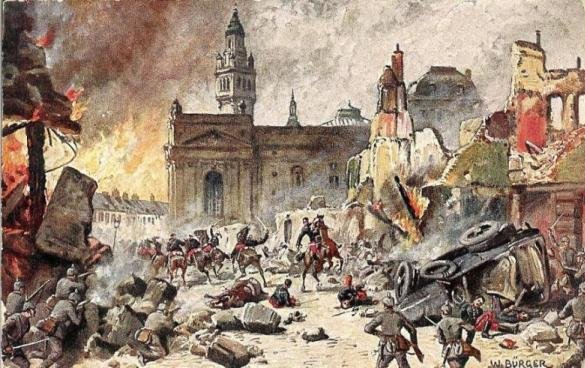
Only a few regiments have had to give such a heavy toll in blood in their first fight . . . . [After three days of fighting, the] proud List Regiment had melted down to the strength of a battalion . . . . [More than half of its officers had been killed, including] the brave regimental leader, Colonel List, felled by a direct hit in the furthest forward line. 35
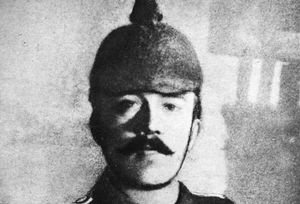
So we went on fighting for three days in the same way, and on the third day the British were finally defeated. On the fourth evening we marched back to Werwick. Only then did we know how many men we had lost. In four days, our regiment—having consisted of thirty-five hundred men—was reduced to six hundred. In the entire regiment, there remained only thirty officers. Four companies had to be disbanded. But we were all so proud of having defeated the British! Since that time, we have been continually in the front lines. I was proposed for the Iron Cross; the first time in Messines; then again at Wytschaete, by Lieutenant Colonel Engelhardt, who was our regimental commander. Four other soldiers were proposed for the Iron Cross at the same time. Finally, on December 2, I received the medal [EK2]. 37
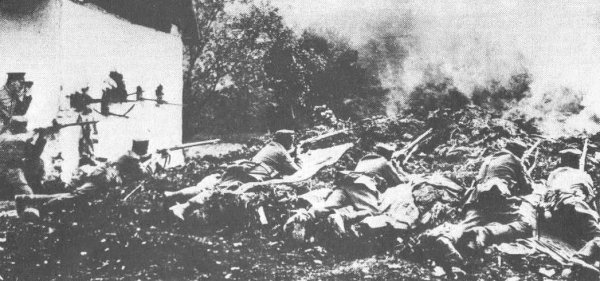

On a clear, mild early November morning, the Kaiser suddenly appeared at the Front. On time, and quite early, it was certainly before 8 o'clock. And quite close to the furthest trenches. A few hundred paces away, English gunners threatened. What did the Kaiser do? He laughed, because the Englishmen had shot up the lions on our battalion flag, and he congratulated our leaders on the courage of the regiment. Then he dashed off in the waiting car. 39
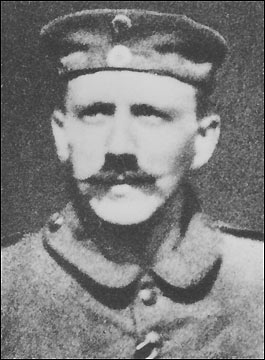
I have known Hitler since the departure for the front of the Bavarian 16th RIR. I came to know Hitler as a good soldier and faultless comrade. I never saw Hitler attempt to avoid any duty or danger. I was part of the division from first to last, and never heard anything bad about Hitler, then or afterwards. I was astonished when I later read unfavorable things about Hitler’s service as a soldier in the newspapers. I disagree entirely with Hitler on political matters, and give this testimony only because I highly respect Hitler as a war comrade. 41
1914 November 4 A regimental roll-call reveals that regimental strength has fallen to "no more than 725 non-commissioned officers and men." In a total of five days on the front, the regiment has lost two-thirds of its battle-strength. 42
Hitler, and his comrade Schmidt had already delivered their first dispatches because of battlefield necessity, and had proved to have an aptitude for it. Dispatch runners are vital in these days before radio communications on the battlefield, and it is very dangerous work. Runners are normally sent out in pairs to increase the probability that at least one would get through with the message. They carry no arms except small revolvers. The dispatches are sent out sealed in leather dispatch wallets attached to the runners' belts. The dispatches are marked on the outside with either an XXX for "urgent", an XX for "quick," or an X for "in your own time". The losses among dispatch runners are relatively high, and 3 of the initial eight will be dead before the end of November. By December, the regiment will be reduced to one-third combat strength. 44
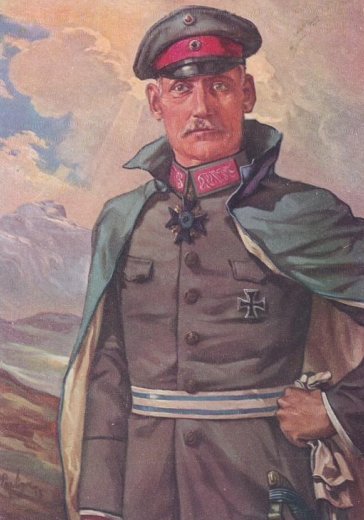
Soldiers! The eyes of the whole world are upon you! We cannot let up in the fight to finally break the arrogance of our hated enemy. Already countless [enemy] officers and men have voluntarily surrendered. But the greatest, decisive battle awaits us: You must therefore hold out to the last man. You will persevere, so as not to let them out of your teeth. We must be victorious, we want to be victorious, and we will be victorious. Rupprecht, Kronprinz von Bayern. 45

The assault began at 7 o'clock precisely; but the troops had scarcely left their protective cover when the enemy threw down a murderous rifle and machine-gun fire on the unprotected assault troops. Worst of all was an enemy battery on the left flank, which caused such heavy losses as to render any further progress unthinkable. Hour after hour passed, without it being possible to make even the slightest forward movement. 46
When their new commander, reserve officer Lieutenant Colonel (Oberstleutnant) Philipp Engelhardt, foolishly steps forward from his forest cover and—drawing French fire on his very first day in command—his life is protected by Hitler and three other dispatch runners who, leap forward to cover their officer and, coax him back to safety.As commander of the 16th Regiment of Bavarian Infantry at the Battle of Ypres in the period from November 10 to November 17 1914, I came to know Adolf Hitler as an exceedingly brave, effective, and conscientious soldier. I must emphasize the following: As our men were storming the wedge-shaped forest, I stepped out of the woods near Wytschaete to get a better view of developments. Hitler and the volunteer Bachmann—another battle orderly belonging to the 16th regiment—stood before me to protect me with their bodies from the machine-gun fire, to which I was exposed. 47
The above reminiscence by Engelhardt was written in 1932, and while it is basically accurate, a few details are not. The men were not "storming the wedge-shaped forest": but were actually trapped in a ravine by heavy fire, to which Engelhardt had exposed himself to determine the reason for the delay.The regimental commander wanted to intervene personally and set out from the ravine for the edge of the woods. [But] he had hardly been discovered by the keen eye of the enemy, when murderous infantry and machine-gun fire was directed at him. He would have paid with his life for his foolhardiness, [had not] the regimental orderlies accompanying him—Adolf Hitler and Bachmann—sprang forward, [and] protected him with their bodies: pushing him back to safety, saying that the regiment could not afford to lose its second commander in so short a time . . . . Unfortunately, the fears of the two orderlies were fulfilled all too quickly. 48
Click to Enlarge
Drawing from the Front, by Hitler
My job now is to carry dispatches for the staff. As for the mud, things are a bit better here, but also more dangerous. In Wytschaete during the first day of the attack, three of us eight dispatch riders were killed, and one was badly wounded. The four survivors—and the man who was wounded—were cited for their distinguished conduct. While they were deciding which of us should be awarded the Iron Cross, four company commanders came to the dugout. That meant that the four of us had to step out. We were standing some distance away about five minutes later, when a shell slammed into the dugout, wounding Lieutenant Colonel Engelhardt, and killing or wounding the rest of his staff. This was the most terrible moment of my life. We worshiped Lieutenant Colonel Engelhardt. 49
1914 November 17 Lieutenant Colonel Philipp Engelhardt narrowly escapes death when their primitive regimental hut is hit by a shell. Hitler had left the hut 5 minutes earlier and just missed being in the explosion. Engelhardt is severely wounded by shrapnel, but survives, while 7 others in the hut are not so fortunate. 50[Engelhardt's] left hand was mutilated and a shell splinter had severed the main artery of his right thigh. Since these wounds were not immediately noticed in the excitement and because of the prevailing darkness, the resulting rapid and heavy loss of blood caused his gradual loss of consciousness, and with the words: "I wanted to serve the Fatherland," he sank backwards. 51
Lieutenant-Colonel Petz will soon assume temporary command of the List Regiment. 52In those days, although the regiment had no way of knowing [for certain], this wish [transfer to the Eastern Front] was almost fulfilled. On 19 November advice was sent to Crown Prince Rupprecht from the high command that six divisions—among them our 6th BRD—were to be placed under the command of Hindenburg, who had already won a decision in the East. But the List Regiment's luck would not be sweet. This did not happen . . . .
Without rest, the difficult activity of fortification work begins. New trenches [are] built, and connected by communications trenches . . . . [The] front is being built with toughness and speed, [with] the sweat and blood of the best. This collaborative work is for Life; Death is the employer. The sooner it is complete, the less time for the enemy to fire, the deeper the trenches, the more secure the shelter, the safer the cover against shrapnel, the better to withstand shells. 53
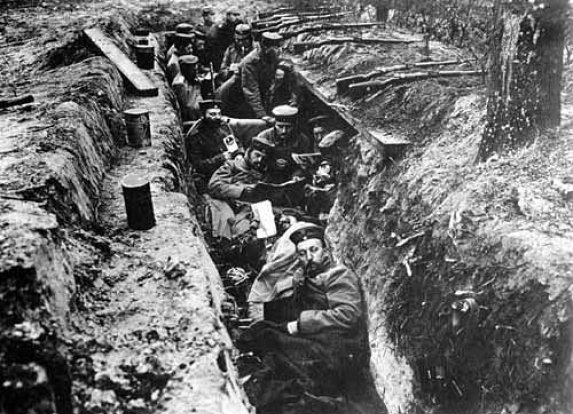
Days and weeks passed, for all of us in a state of the greatest stress, which cost many good comrades their lives . . . . Even if filthy, sulfur-yellow like a canary, with bullet holes in the great coat or dispatch case, the lucky ones among us were glad to be able to march safely back into our quarters. With steaming coffee or a "Blue Henry" [Schnapps] the adventures of the preceding day were made light of, through wit and humor. In all of this, Adolf Hitler was no spoilsport, on the contrary, he livened things up with his ideas and interruptions: but about his work, he never spoke.
However, Mend, as well as a number of other "Listers," notice a strangeness surrounding Gefreiter Hitler, a certain morbidity. Mend, on a trip to Lille one day catches sight of "an infantryman standing with his rifle at his feet. From his stance, I immediately recognized Adolf Hitler."Two dead men, in whom he seemed very interested, lay in front of him. [Hitler] looked around and stretched his head, as though sensing danger. But in spite of the greatest danger to life and limb, he remained next to the dead men. Once he turned in my direction, probably since he recognized me and wanted to see how I would get through this crater field.
Coming across Hitler again the next day, he asks him what it was about the two corpses he had "found so interesting." Hitler answers: "I took a look at two dead men on whom grass was already growing." Mend suggests "that it was absolutely unnecessary to remain at that place, unless you want to catch moles. Hitler tugged at his mustache, as if to say, "Dispatch rider Mend, you look after yourself, I'll look after myself." Before we parted, I remarked: "Your bones could be lying in that corner of the battlefield at Messines." 54
At particularly dangerous points I often was asked for volunteers, and at such times Hitler regularly volunteered, and without hesitation . . . . If Adolf Hitler had been promoted to the rank of sergeant, the regiment would have lost one of its best dispatch carriers. 55
1914 December 1 If the List Regiment were at full strength, it would have 46 officers, 3,097 other ranks and 180 horses; at this time however, its combat strength stands at 21 officers, 1,432 other ranks, and no horses. Much-needed reinforcements begin arriving as the rainfall continues to increase. 56
Click to Enlarge
Messenes Monastery Ruins, December 1914, by Hitler
It was of small satisfaction to us that the positions of our opponents were just as bad as our own, for the English had also suffered heavily from the mass of water forcing its way into the trenches. Once they tried, by opening the sluice valves, to flood our position but our pioneers had prevented this plan in time . . . . To put it bluntly, the way our troops existed was not to be envied. 60
1914 December 15-24 Two-thirds of the regiment is put on alert in anticipation of a British offensive that never quite materializes; Nevertheless, the regiment endures continuing artillery barrages.Tommy doesn't come. But he send his shells . . . . On 15 December heavy artillery begins. One shell strikes the command post of the 2nd battalion . . . . On the afternoon of 19 December [another] hits the 1st battalion assembly area in the cloister of Messines and kills four, wounding 26 . . . . A few days later, [another shell lands] in the vicinity of the cloister, and buries 13 men alive. 61
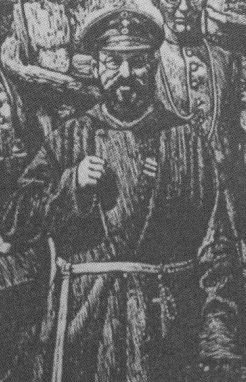
Some wounded soldiers lie in pain for days in the fields, exposed to shellfire, without being found. Once the wounded have been placed in the casualty station, they have to lie in wet cellars or destroyed houses because of the difficulty of evacuation; [they are] abandoned to the shellfire and to adverse exposure. 62
1914 December 25-29 By this first Christmas of the war, the rain finally gives out, just as the weather turns seasonably cold. Ignaz Westenkirchner asks Hitler: "Haven't you anyone back home? Isn't there anyone to send you things?" Hitler: "No, only a sister, and heavens knows where she is by this time."What I noticed first was his unmilitary manner and his slight Austrian accent, and most of all, that he was a serious person who obviously had been through quite a lot in life . . . . Adolf was the serious kind always busy with serious matters. He could talk about everything and us [Sic], simple soldiers, we were very much impressed and we loved it. Hitler was always the one to buck us up when we got downhearted: he kept us going when things were at their worst; but he couldn't cook! That was the one thing he couldn't do." 63

At 3 o'clock on the morning of 26 December, we were moving forward in the trenches. Everyone was frozen hard. [I] prepared myself to be met by heavy fire. But imagine my astonishment when not a shot came. The men we relieved told us that they had been exchanging things with the English, which seemed crazy to us. As proof, I found a few English cigarettes in my dugout, which tasted very good . . . . [After dawn Englishmen appeared and] waved to us, to which our people replied . . . . Everyone [now] moved freely out of the trenches and it would have been unthinkable to have fired a shot. What had seemed crazy only a few hours before, I was now able to see with my own eyes . . . . [Men who] until now [had been] the fiercest of enemies shook hands, spoke to one another and exchanged things . . . .

The wet and the cold, the continual state of anxiety and the unaccustomed food cause stomach and intestinal illnesses, from the 1st Battalion alone 80 men report sick. On 13 January the unpopular inoculation against typhus is given. The men, who have not been out of wet clothes for a week, enjoy for the first time the blessing of a bath in the swimming pool at Comines. 67
1915 January 15 Alois Schnelldorfer, a new recruit to the 16th RIR, writes home:I was at church in the morning. I wish that you could see something so celebratory some day. The windows are blown out. There was a German sung Mass being held in which about 500-800 men took part. 68
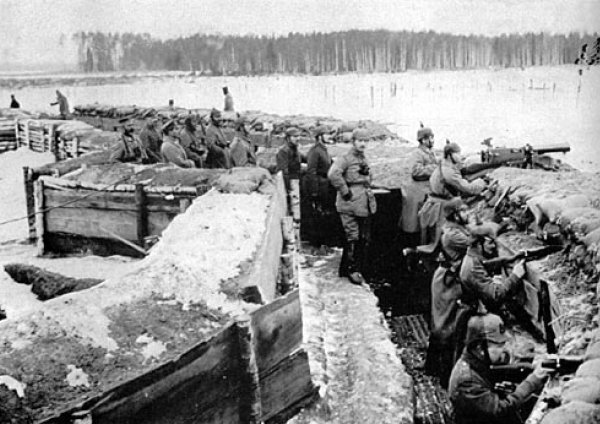
Now we are still in our old position, and harass the French and English. The weather is miserable. Often for days in water up to our knees under very heavy artillery fire. We are looking forward to a few days of relief. Hopefully, there will soon come a general offensive along the whole front. It can't go on like this forever.
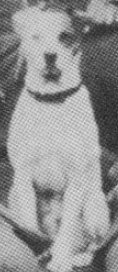
It was in January 1915 that I got hold of Foxl [Little Fox]. He was engaged in pursuing a rat that had jumped into our trench. He fought against me, and tried to bite me, but I didn't let go. With exemplary patience (he didn't understand a word of German), I gradually got him used to me. 69
1915 Late January Hitler again writes his Munich friend, Josef Popp:Because of the constant rain—we do not have winter—the closeness of the ocean, and the low-flying terrain, the meadows and fields are like bottomless morasses, while the streets are covered with slimy mud; and through these swamps run the trenches of our infantry, a mass of shelters and trenches with gun emplacements, communication ditches and barbed wire barricades, wolf lairs, land mines: in short, an almost impossible position." 70

While the troops in Warneton [a village nearby to Comines] stay by day in their cellar rooms and are only allowed to slink along the house walls on necessary errands, the civilians can move freely through all the streets and squares. The goal in this is to deceive the enemy about the presence of troops and to deter the enemy from bombardment out of consideration for the inhabitants. Enemy planes circle constantly over Warneton for surveillance purposes. 71
1915 February 17 Balthaser Brandmayer, an Infanterist recruit fresh out of basic training, experiences his first day in a Western Front trench:Fear of death threw us newcomers to earth, much to the amusement of the old hands . . . . Unknown territory [no-man's land] lies before me. I prick up my ears; bursts of intermittent fire from English machine guns terrify me. In my deluded state, I imagine I can see Death, and the Devil, until the person beside me brings me to me senses with scolding and curses. Patrols and sentries change over. In the evening the enemy artillery fire lights the sky. 72
1915 February 23 Hitler's regiment is pulled out of the front line for a well-earned two weeks rest. Hitler uses some of this free time to write a long, autobiographical letter (The Hepp Letter) to his lawyer and friend, Ernst Hepp.I am sorry, I will have to close now. The really important thing for me is to keep thinking about Germany. From eight in the morning to five in the afternoon, day after day, we are under heavy artillery fire. In time, even the strongest nerves are shattered by it. I keep thinking about Munich, and there is not one man here who isn't hoping that we shall soon finish off this rabble once and for all, make mincemeat of them, at whatever the cost. The hope is that those of us, who have the good fortune to see our homeland again will find it purer and less corrupted by foreign influence. The sacrifices and misery exacted daily from hundreds of thousands of people, the rivers of blood flowing every day against an international world of enemies will, we hope, result in smashing Germany's external enemies, and bring about the destruction of our internal internationalism. That would be better than any territorial gains. As for Austria, it will come about as I have already told you. 73

All night long, one could hear the singing regiments and troop units pull through the streets. We moved out of Comines like moving away from home. The French people and the remaining German troops stood in the street everywhere, to wish us farewell. People were waving after us from all the windows . . . . Naturally we were in a cheery mood, as we were moving towards a better future. 75
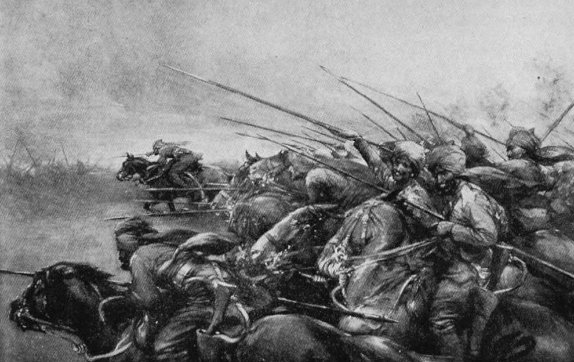

In order to recapture the lost territory, the 2th BRD, which had just been withdrawn from its position by Messines, was driven up to support the VII Corps. The division entered battle not in collective bodies. Regiments, battalions, detachments, companies, and batteries were thrown into the battlefield, as soon as they arrived at the railway station, and they were divided up among the Prussian troops' formations. A motley crew was the consequence. 77
Hans Mend:The confusion came into being because the different formations from our regiment, as they disembarked from their trains, were immediately marched to the Front and had gone into action, on their own account, between Prussian troops. The battle orderlies, Hitler, Lippert, Schmidt, and Weiss had the task, in so far as possible, to re-establish the connection, which was made all the more difficult by the frightful fire and the soggy ground underfoot. Hitler said later in Fournes that he had to deliver reports by creeping forward from one shell-hole to another, and that sometimes the sulfur fumes only allowed him to see 10 metres to the Front . . . . . [While waiting, Hitler paced] around like a restless tiger in the farm at Halpegarde . . . . Even the Colonel said: "I can scarcely believe that my orderlies can come through this fire". 78

Steel rains down on the assault troops. Trees crash down, the copse is crushed into thousands of splinters and fragments. The land is swamp and morass, filth clings to our boots . . . . At the edge of the woods [we] swarm out. The going is tough. We charge toward the enemy. Shrapnel whizzes a hair's breadth above my head. Our artillery is ineffective. The air is impregnated with smoke and cordite. My group leader falls, badly wounded . . . . He wallows in his own blood, we must still keep advancing. It is raining. The wounded cry and whimper and rattle. Help is not possible. The swarming assault lines are caught in a storm. I stray toward the ruined house in front of a communication trench. Schmidt stands there, pistol drawn, screaming: "Keep going, I'll shoot you . . . . shoot you!" It seems hours later that a shrapnel ball hits me. From the back of my neck worm blood trickles down my back. I lie in the field until the onset of darkness, when merciful comrades drag me to the first-aid station . . . . The horror of this attack puts the first silver streaks in my hair. 79
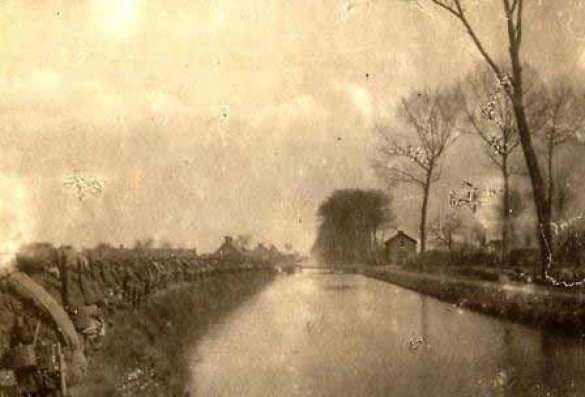
After early successes, our prepared attack to reoccupy the village of Neuve Chapelle was met by strong English superiority and therefore, not carried further.
While the German counterattack is ultimately unsuccessful, it does at least end any chance of further British advance at Neuve Chapelle. 80

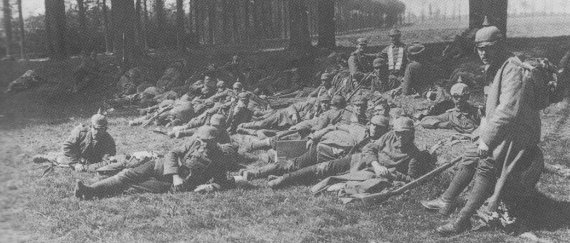
Soldiers! By deploying 48 battalions against three, the enemy has succeeded, despite the heroic opposition of the occupying troops, in taking away a tiny fraction of our position. We have failed to recapture it. But your attack has broken the enemy's enterprise. Two enemy army corps have not ventured to push on from the captured village, whose possession is of secondary importance. I express my thanks [and] my warmest appreciation for your fighting courage and your sacrifice. 81
Click to Enlarge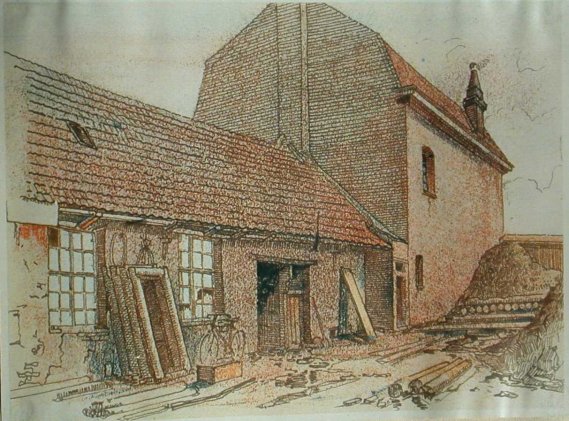
Fromelles Watercolor, 1915, by Hitler
But only in a few places is the position constructed so: each squad [has] a small white island, in between great gaps without wall or trench [and] scarcely a barbed-wire entanglement. It is no better to the rear. There is no communications trench to protect the dispatch runners; they must carefully crawl back and forth beside a row of willows. A soldier's grave with a helmet, in a water-filled trench, gives us something to think about . . . . The enemy, Canadians as it happens, are mostly quiet by day but at night they spread fire—they possess more machine-guns than we—richly over our lines with the consequence that obtaining food and working on the trenches becomes extremely unpleasant. 82
Under the direction of their defense-minded commander, Lieutenant General Gustav Scanzoni von Lichtenfels, the regiment works ceaselessly day and night in the subsequent weeks, to further fortify their position at Fromelles.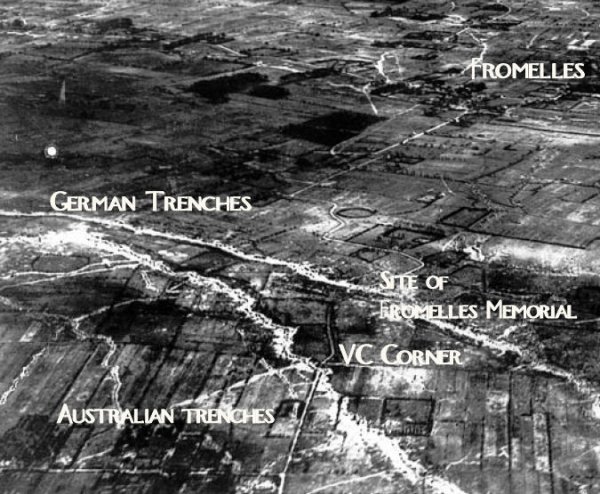
Standing guard, filling sand bags, carrying loads: one unpleasant task follows the other, with no let up. [We] are laying the groundwork for a position of such serviceability, so as to offer protection and defensive possibilities for one and a half years. Very soon, in the general early-year offensive of May 1915, are we able to harvest the fruits of this bitter labor. Many comrades, embittered by the work of entrenchment, learn to recognize its worth during the attack of 9 May. 83
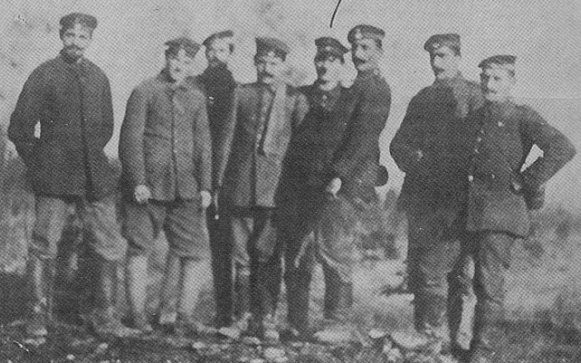 Hitler and his fellow dispatch runners
Hitler and his fellow dispatch runners
The most dangerous time for a dispatch runner is delivering a message for the first time from a new position. [I warned Hitler] "You're a mole. You'll come through all right, just don't let them shoot you in the guts." "That's my business, my dear Mend," Hitler replied. [The] communications trenches leading to the positions further forward provided little protection, they were not deep enough and already, on the first crossings, caused many casualties. Adolf Hitler had to take these dangerous paths several times daily and, if he wanted to come through safe and sound, was obliged to crawl rather than march. Not even the slightest movement escaped English snipers. 84
16th RIR officer candidate Joseph Lohr:I often met Corporal Adolf Hitler as he served as courier to and from the front. Anyone who understands the duties of a courier—and any soldier who has served at the front does—knows what it means, day after day, and night after night, to move through artillery fire and machine gun fire from the rear. 85
1915 April 26 Alois Schnelldorfer writes to his parents back home:While reading the papers, I discovered so many "new" things [and learned] how wonderful the war and life in the trenches was . . . . Such news comes mostly from people who are five hours behind the front, who hear shooting, ask someone about it, and then explain everything ... as if they had taken part in it. What I am writing you only presents part of the truth, telling you how well it's going here for me. But it's not like this every day. 86
1915 April 28 From Father Norbert's diary:The [welcome] ceremony [for new recruits] made a deep impression on the soldiers, who were very solemn from the funeral preceding the ceremony. Only three days earlier had they said goodbye to their homes; now they were already so close to the serious realities of war . . . . So many tears roll down the faces of the young and also the old, as we have many Landwehr men among our replacements. Deeply shaken, the comrades now receive the General Absolution. 87
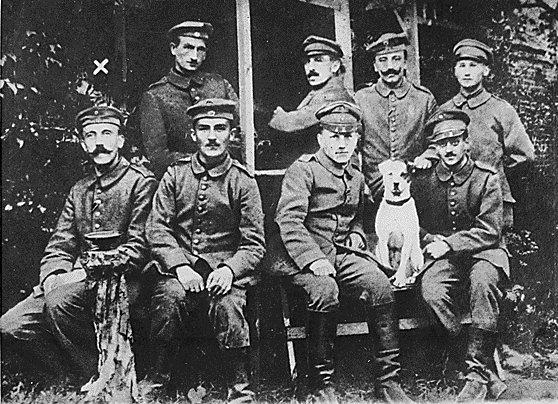



Adolf Hitler, May 1915
The English artillery shakes and hammers the whole territory . . . . All dispatches advise that the English have systematically zeroed-in on approach paths, cross roads, and quarters. By evening, the impression exists in the division that an attack is imminent. This impression is reported to OHL. 93

Nothing could be seen, frightful screams and cries for help could be heard from neighboring houses still inhabited by civilians. When the sulfurous fumes dispersed, I saw civilians dressed only in shirts; women with children in their arms, wandering around the street. The schoolhouse had been smashed, and the ruins scattered widely. The bodies of our comrades [who had been housed] there had been torn to pieces and made a ghastly sight . . . . 94
[Not long afterwards, Hitler had delivered several dispatches], exposed to the heavy barrage on the way from Fromelles to the fighting zone . . . . [Hitler reported that] "Every shell-hole is being bitterly contested. Because of our barrage, the English have been cut off from all possible help. Many are hanging on the electric barbed-wire, and screaming horribly." As we knew [Hitler] to be a man who never exaggerated and, who expressed himself carefully in such situations, we knew now that a bloody fight was being waged. His expression also attracted attention. He must have seen much horror and have joined in the fighting himself; the expression of the eyes in his thin yellow face told us much. 95

English muzzles flame in the early morning light, a never-experienced barrage from a thousand guns rises, and drives us into the deepest corner of the dugout. The earth no longer offers protection. I stare, lost, in the dark of the dugout. With all limbs trembling, I groan in despair, then consciousness fades—I don't know no more . . . .
Towards midday, we advance in a counter-attack, and stubbornly, metre after metre is retrieved from him. All lost territory reverts finally to our possession, With night falling, we are relieved . . .
Fournes, still a town of a few thousand inhabitants until a few months ago, lies in rubble and ashes. The dreadful experience of the last few days had broken me. Apathetically, and lost to the world, I ponder my fate. I have narrowly avoided death and still cannot believe that I am alive. 96
I can only give former Corporal Hitler the greatest praise for his extraordinary accomplishments. Fournes was a village behind the regiment’s battle line. It served as a recovery area for battalions relieved from the front, and also served as the seat of the regimental staff during calmer periods. The village was within the danger zone, and was frequently under rather heavy fire. During battle, the regimental headquarters was moved about 3/4 of an hour forward to Fournelles, and orders had to be carried to the front line. The path was often under enemy machine-gun and artillery fire. I can never remember a single time when Hitler was absent from his post. Hitler may wear the medals he earned with pride. 97
From the official Bavarian history:On 9 May, fulfilling a promise that General French—the English supreme commander—had given to the French military leadership, the IV English corps attacked to the north-west of this village [Fromelles]. The assault met, in the center of the 6th BRD, the 16th RIR. At 7:00 am, two heavy mine explosions, which buried alive six groups of trench garrison troops, enabled the enemy to break into the position of the 16th RIR to a depth of some 200 metres. The flood was dammed thanks to the bitter opposition of the remaining troops . . . . as well as the help of the neighboring troops from 21st and 17th RIRs, while the well-placed fire of the artillery made it possible for the English to reinforce their troops. In hard fighting the front-line trenches were retaken during the day. Then, the enemy, who had been drawn deep into the position and then cut off, were wiped out, or hunted down. The desire for further attacks was taken from the English. 98
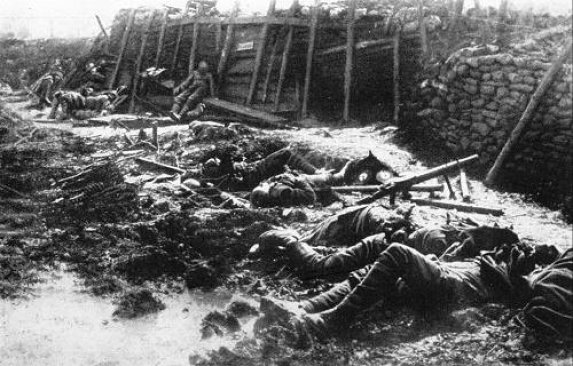
It was no secret to French GQG that great masses of German troops were demanded in the East and that because of this the strong superiority of the Franco-English armies facing the Germans on the Westen Front was guaranteed. The prospects of success had never been so favorable. At La Bassée, the English and Indians [were] given bloody heads by the brave Westphalians. Before Fromelles they fared no better, here Bavarians held sway. 99
1915 May 23 Italy declares war on Germany and Austria.
End of Part Seven.
Next: WW1, Part Two



Written by Walther Johann von Löpp Copyright © 2011-2013 All Rights Reserved Edited by Levi Bookin — Copy Editor European History and Jewish Studies






Disclaimer:The Propagander!™ includes diverse and controversial materials--such as excerpts from the writings of racists and anti-Semites--so that its readers can learn the nature and extent of hate and anti-Semitic discourse. It is our sincere belief that only the informed citizen can prevail over the ignorance of Racialist "thought." Far from approving these writings, The Propagander!™ condemns racism in all of its forms and manifestations.
Fair Use Notice: This site--The Propagander!™--may contain copyrighted material the use of which has not always been specifically authorized by the copyright owner. We are making such material available in our efforts to advance understanding of historical, political, human rights, economic, democracy, scientific, environmental, and social justice issues, etc. We believe this constitutes a "fair use" of any such copyrighted material as provided for in section 107 of the US Copyright Law. In accordance with Title 17 U.S.C. Section 107, the material on this site is distributed without profit to those who have expressed a prior interest in receiving the included information for research and educational purposes. If you wish to use copyrighted material from this site for purposes of your own that go beyond 'fair use', you must obtain permission from the copyright owner.